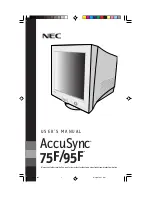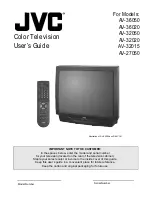
24
DTT DISABLE CONNECTION
•
•
Pin 3
is the DTT disable input from pin 7 of I006. This input is inverted and is outputted at pin 4, before being connected
to pins 12 & 13 of the analogue switch (I008).
I2C DISABLE CONNECTION
•
Pin 5
is the I2C disable input from pin 33 of the microcontroller. This signal is inverted and output at pin 6 to pins 5 & 6 of
the analogue switch (I007). When the microcontroller is in the reset condition, or when the TV is in the standby state, the
I2C disable line is HIGH. This signal must be inverted to disable the microcontroller’s I2C bus from the I2C bus of the rest
of the chassis.
SCART DISABLE CONNECTION
•
Pin 13
is the RS232 Scart Disable input from pin 39 of the microcontroller. This input is inverted and output at pin 12,
which is then connected to pins 12 & 13 of the analogue switch (I007). When the microcontroller is in the reset state, or
when the TV is NOT in service/diagnose modes, the RS232 transmit/receive lines MUST be disconnected from pins 10
and 12 of scart socket 2. This line must then be inverted to prevent any connection being made.
EEPROM (I005)
INTRODUCTION
The ST24C16 EEPROM, or E2 as it is commonly known, is a 16Kbit (2Kbyte) device that holds non-volatile data when power is
removed from the TV. This device can hold information for 100 programmes, such as the name, frequency, standard, AV setting,
speaker language setting and teletext favourite pages. The EEPROM also holds diagnostic fault codes used to help identify
previous faults with the chassis (see separate section that deals explicitly with this). The E2 also holds factory aligned parameters,
such as the geometry, white balance, tuner AFC/AGC, model type, cathode level, etc. The E2 also holds the user’s preferential
settings, such as the volume, balance, contrast, brightness, etc. Data is written to/ read from the device using the standard Philips
I2C protocols.
DESCRIPTION
SUPPLY/GROUND CONNECTIONS
•
Pins 8
and
4
are the +5V supply and ground (0V) connections respectively. The EEPROM is powered from the +5V
standby rail so that it always has power to it, even when the TV is in standby.
I2C CONNECTIONS
•
Pin 5
is the I2C Data line needed to transfer serial data between the microcontroller and itself. Data is changed when the
clock line is low and latched on the rising edge of the I2C clock.
•
Pin 6
is the I2C clock line needed to synchronise the I2C data transfer. 9 clock pulses are needed for the 8-bit data and
an acknowledge bit. The I2C master clock originates from the microcontroller and operates at a frequency around
100KHz.
ADDRESS CONNECTIONS
•
Pins 1
to
3
are the address lines used to select the I2C slave address of the device. On the ST24C16 device, these lines
must be connected to ground in order to access the device properly.
WRITE DISABLE CONNECTION
•
Pin 7
is the I2C write enable/disable input. When this input is HIGH (+5V), all I2C writes to the device are denied. When
the pin is pulled low by the microcontroller (pin 22 E2RD), data can be written to the device. In this manner, inadvertent
write operations can prevent the I2C data from being corrupted.
74HC595 SHIFT REGISTER (I006)
INTRODUCTION
The 74HC595 is a 16-pin high-speed CMOS 8-bit shift register used for additional output port capability on the A8/D8 chassis. 8-bit
data is serially shifted into the device and then latched to the outputs when so desired. These outputs are not used when the TV is
in the standby state.
DESCRIPTION
SUPPLY/GROUND CONNECTIONS
•
Pins 16
and
8
are the +5V supply and 0V ground connections respectively. This device has +5V supplied to it, even when
the TV is in the standby state. Capacitor C024 is used to de-couple the supply.
VM ON/OFF OUTPUT CONNECTION
•
Pin 1
is used to turn On (LOW) or Off (HIGH) the VM (velocity modulation) circuit of some high-end chassis. This
improves the transition from black to white (and vice versa) areas of the picture to sharpen them up. This is particularly
noticeable at the outer areas of the CRT. This output pin is connected to the +5V signal supply and so is left floating when
the TV is in the standby state. The diode, D008, prevents any leakage current from flowing from pin 1 to the VM circuitry
when the TV is in the standby state.
Summary of Contents for C28W40TN
Page 29: ...28 GENERAL BLOCK DIAGRAM ...
Page 91: ...90 CASE DE FONCTIONS EXTRÉMITÉ HAUTE CASE FONCTIONS EXTRÉMITÉ BASSE ...
Page 102: ...101 SCHÉMA SYNOPTIQUE ...
Page 165: ...164 HÖHERE FEATURE BOX NIEDRIGE FEATURE BOX ...
Page 177: ...176 BLOCKSCHALTBILD ...
Page 200: ...199 ...
Page 225: ...224 WAVEFORMS ...
Page 226: ...225 ...
Page 227: ...226 ...
Page 228: ...227 ...
Page 229: ...228 ...
Page 230: ...229 IC DATA I200 ...
Page 231: ...230 ...
Page 232: ...231 ...
Page 233: ...232 IE01 ...
Page 234: ...233 ...
Page 235: ...234 IE02 ...
Page 236: ...235 ...
Page 237: ...236 ...
Page 238: ...237 MECHANICAL ...
Page 239: ...239 C32W35TN ...
Page 240: ...240 C32W35TN ...
Page 241: ...241 C32W35TN ...
Page 242: ...242 CL28W35TAN ...
Page 243: ...243 CL28W35TAN ...
Page 244: ...244 CL28W35TAN ...
Page 245: ...245 CL32W35TAN ...
Page 246: ...246 CL32W5TAN ...
Page 247: ...247 C35W35TN CL28W35TAN CL32W5TAN ...
Page 248: ...248 C35W35TN CL28W35TAN CL32W5TAN ...
Page 249: ...249 C35W35TN CL28W35TAN CL32W5TAN ...
Page 250: ...250 C35W35TN CL28W35TAN CL32W5TAN ...
Page 251: ...251 C35W35TN CL28W35TAN CL32W5TAN ...
Page 252: ...252 C35W35TN CL28W35TAN CL32W5TAN ...
Page 253: ...253 C35W35TN CL28W35TAN CL32W5TAN ...
Page 254: ...254 C35W35TN CL28W35TAN CL32W5TAN ...
Page 255: ...255 C35W35TN CL28W35TAN CL32W5TAN ...
Page 256: ...256 C28W40TN C32W40TN ...
Page 257: ...257 C28W40TN C32W40TN ...
Page 258: ...258 C28W40TN C32W40TN ...
Page 259: ...259 C28W40TN C32W40TN ...
Page 260: ...260 C28W40TN C32W40TN ...
Page 261: ...261 C28W40TN C32W40TN ...
Page 262: ...262 C28W40TN C32W40TN ...
Page 263: ...263 C28W40TN C32W40TN C28W40TN C32W40TN ...
Page 264: ...264 C28W40TN C32W40TN ...
Page 265: ...265 C28W40TN C32W40TN ...
Page 266: ...266 C28W40TN C32W40TN ...
Page 267: ...267 C28W40TN C32W40TN ...
Page 268: ...268 C28W40TN C32W40TN ...
Page 269: ...269 C28W40TN C32W40TN ...
Page 270: ...270 C28W40TN C32W40TN ...
Page 271: ...271 C28W40TN C32W40TN ...
Page 272: ...272 C28W40TN C32W40TN ...
Page 273: ...273 C28W40TN C32W40TN ...
Page 274: ...274 C35W35TN CL28W35TAN CL32W5TAN ...
Page 275: ...275 C35W35TN CL28W35TAN CL32W5TAN ...
Page 276: ...276 C35W35TN CL28W35TAN CL32W5TAN ...
Page 277: ...277 C35W35TN CL28W35TAN CL32W5TAN ...
Page 278: ...278 C35W35TN CL28W35TAN CL32W5TAN ...
Page 279: ...279 C35W35TN CL28W35TAN CL32W5TAN ...
Page 280: ...280 C35W35TN CL28W35TAN CL32W5TAN ...
Page 281: ...281 C35W35TN CL28W35TAN CL32W5TAN ...
Page 282: ...282 C35W35TN CL28W35TAN CL32W5TAN ...
Page 283: ...283 C35W35TN CL28W35TAN CL32W5TAN ...
Page 284: ...284 C35W35TN CL28W35TAN CL32W5TAN ...
Page 285: ...285 C28W40TN C32W40TN ...
Page 286: ...286 C28W40TN C32W40TN ...
Page 287: ...287 C28W40TN C32W40TN ...
Page 288: ...288 C28W40TN C32W40TN ...
Page 289: ...289 C28W40TN C32W40TN ...
Page 290: ...290 C28W40TN C32W40TN ...
Page 291: ...291 C28W40TN C32W40TN ...
Page 292: ...292 C28W40TN C32W40TN ...
Page 293: ...293 C28W40TN C32W40TN ...
Page 294: ...294 C28W40TN C32W40TN ...
Page 295: ...295 C28W40TN C32W40TN ...
Page 296: ...296 C28W40TN C32W40TN ...
Page 297: ......
Page 299: ...Users Guide C28W40TN C32W40TN ...
Page 351: ...notes ...
Page 352: ...notes ...
Page 353: ...notes ...
Page 355: ...Users Guide C28W35TN C32W35TN S C R E E N S C R E E N ...
















































